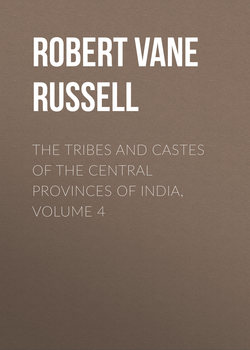Читать книгу The Tribes and Castes of the Central Provinces of India, Volume 4 - Robert Vane Russell - Страница 120
Part II
Articles on Castes and Tribes
Kumhār—Yemkala
Vol. IV
Mahār
12. Social rules
ОглавлениеWhen an outsider is to be received into the community all the hair on his face is shaved, being wetted with the urine of a boy belonging to the group to which he seeks admission. Mahārs will eat all kinds of food including the flesh of crocodiles and rats, but some of them abstain from beef. There is nothing peculiar in their dress except that the men wear a black woollen thread round their necks.130 The women may be recognised by their bold carriage, the absence of nose-rings and the large irregular dabs of vermilion on the forehead. Mahār women do not, as a rule, wear the choli or breast-cloth. An unmarried girl does not put on vermilion nor draw her cloth over her head. Women must be tattooed with dots on the face, representations of scorpions, flowers and snakes on the arms and legs, and some dots to represent flies on the hands. It is the custom for a girl’s father or mother or father-in-law to have her tattooed in one place on the hand or arm immediately on her marriage. Then when girls are sitting together they will show this mark and say, ‘My mother or father-in-law had this done,’ as the case may be. Afterwards if a woman so desires she gets herself tattooed on her other limbs. If an unmarried girl or widow becomes with child by a man of the Mahār caste or any higher one she is subjected after delivery to a semblance of the purification by fire known as Agnikāsht. She is taken to the bank of a river and there five stalks of juāri are placed round her and burnt. Having fasted all day, at night she gives a feast to the caste-men and eats with them. If she offends with a man of lower caste she is finally expelled. Temporary exclusion from caste is imposed for taking food or drink from the hands of a Māng or Chamār or for being imprisoned in jail, or on a Mahār man if he lives with a woman of any higher caste; the penalty being the shaving of a man’s face or cutting off a lock of a woman’s hair, together with a feast to the caste. In the last case it is said that the man is not readmitted until he has put the woman away. If a man touches a dead dog, cat, pony or donkey, he has to be shaved and give a feast to the caste. And if a dog or cat dies in his house, or a litter of puppies or kittens is born, the house is considered to be defiled; all the earthen pots must be thrown away, the whole house washed and cleaned and a caste feast given. The most solemn oath of a Mahār is by a cat or dog and in Yeotmāl by a black dog.131 In Berār, the same paper states, the pig is the only animal regarded as unclean, and they must on no account touch it. This is probably owing to Muhammadan influence. The worst social sin which a Mahār can commit is to get vermin in a wound, which is known as Deogan or being smitten by God. While the affliction continues he is quite ostracised, no one going to his house or giving him food or water; and when it is cured the Mahārs of ten or twelve surrounding villages assemble and he must give a feast to the whole community. The reason for this calamity being looked upon with such peculiar abhorrence is obscure, but the feeling about it is general among Hindus.
Weaving: sizing the warp
130
Ibidem.
131
Stated by Mr. C. Brown.
